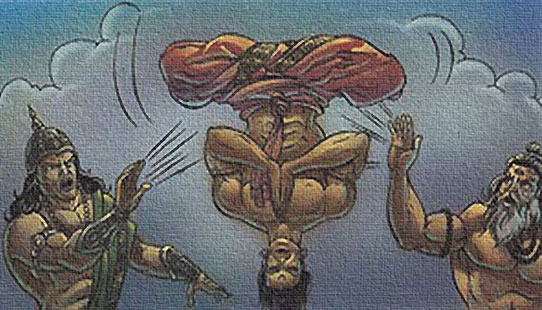O Rama! The sons of Vasishtha, upon hearing King Trishanku’s words, were greatly disturbed, their hearts filled with a fiery resentment. The notion of allowing anyone to challenge the honor of their father was an affront to their loyalty, and anger stirred in each of them. Yet, as custom and courtesy demand, they upheld their respect for the king and replied with restraint.
“King Trishanku,” they began, “our father, Vasishtha, is a man of unwavering truth and honor, dedicated to righteousness. If he has refused your wish, it is because your desire contravenes the very principles of nature. He is the revered priest of your lineage; would you truly seek to overturn his judgment—a judgment issued with the integrity of a devoted father? Please, we entreat you, abandon this path. Return to your kingdom and continue to rule justly.”
But the king, humbled yet resolute, responded, “You are indeed my priests, yet if you do not fulfill my heart’s desire, how can I hope to see my ambition realized? Since both your father and you have denied my request, I shall turn to other means, yet I will not relent in my pursuit.”
In response to his defiance, the sons invoked the might of their penance, pronouncing with unwavering conviction, “This king has defied the truth and integrity of our priest, ridiculing both our father and us. Let a curse fall upon him, transforming him into a Chandala—a man of ignoble appearance, lowly thoughts, and deeds.”
Accepting the curse with grace, the king bowed and replied, “O sages rich in penance, I accept your decree,” and returned to his kingdom. Calling upon his ministers and his son Dandumara, he explained the curse that had befallen him, entrusting them with the care of the realm, under the guidance of Mandhata. And by sunset, his appearance altered, his complexion coarsened, his royal garments replaced with the garb of iron.
One senior counselor then advised him, “Seek refuge with the great sage Vishwamitra, whose power and compassion might yet fulfill your ambition of ascending to heaven in mortal form.”
Heeding this counsel, Trishanku journeyed to Vishwamitra and, with reverence, explained his plight. Moved by the king’s rejection by Vasishtha’s kin, Vishwamitra spoke with sympathy, “From this day forward, fortune will favor you. Speak, noble king of Ikshvaku, why have you come to me?”
“Great sage, I wish to ascend to heaven in this mortal body,” Trishanku replied humbly. “For a hundred yajnas have I performed, ruling my people as a father might care for his children. I have abided by truth and upheld the royal virtues. Yet, despite my dedication, my guru and his sons have denied me, and I am left without hope but for you, O Vishwamitra. Though man’s efforts are limited under God’s design, I seek refuge in you.”

Touched by his plea, Vishwamitra, with a fierce resolve, reassured the king, “Fear not, noble Trishanku. I shall see your desire fulfilled. Prepare for the ritual, and I shall lead it for you.” He instructed his sons and other sages to make the necessary arrangements, sending forth disciples to invite every worthy sage and scholar to attend.
The disciples returned, reporting that while nearly all had accepted the invitation, Mahodaya and others had spoken harshly, deeming it improper for a Kshatriya to lead a yajna, especially one cursed as Trishanku was. “Such a sacrifice, they claimed, cannot be accepted by the gods, and no divine offerings shall be received.”
Hearing this, Vishwamitra’s ire blazed forth, and he cursed these dissenters, condemning them to a life of exile among those who feast on flesh and blood, banished from civilized society. Restoring calm to himself, he blessed those who had come to support him, and with clarity he introduced the king’s plight: “This is Trishanku, the king of Ayodhya, cursed unjustly, yet seeking heaven with my aid. Lend me your strength, that we may succeed in this righteous endeavor.”
Thus, the ritual commenced, brought nearly to completion, yet when the oblations were offered, the gods withheld their response. Raising his hand with the sacred homa sruva ladle, Vishwamitra declared, “Behold the power of my penance, King Trishanku! By my will, I shall send you to heaven in your mortal form. Driven by the virtues you have accumulated, ascend now to the heavens!”
Before all those assembled, the king rose heavenward, but Indra’s voice thundered in protest, “You are not welcome here, for you have been cursed by your own priest. Return to earth!”
As the king fell, crying for aid, Vishwamitra’s resolve blazed anew, halting his descent. With unyielding might, he created a new constellation in the heavens for Trishanku, establishing a realm among the stars and declaring, “What I have created shall remain, and this king shall shine forever as a heavenly presence.”
Acknowledging Vishwamitra’s creation, Brahma and the other gods descended, affirming his work, but cautioning against recreating the cosmos. Vishwamitra, satisfied, agreed, and the stars of his making were placed forever in the heavens, while he concluded the yajna.
Thus, O Rama, the virtues of this sage Vishwamitra are boundless. Let us now turn our attention to the duties that await us, as Sadananda humbly advised.




